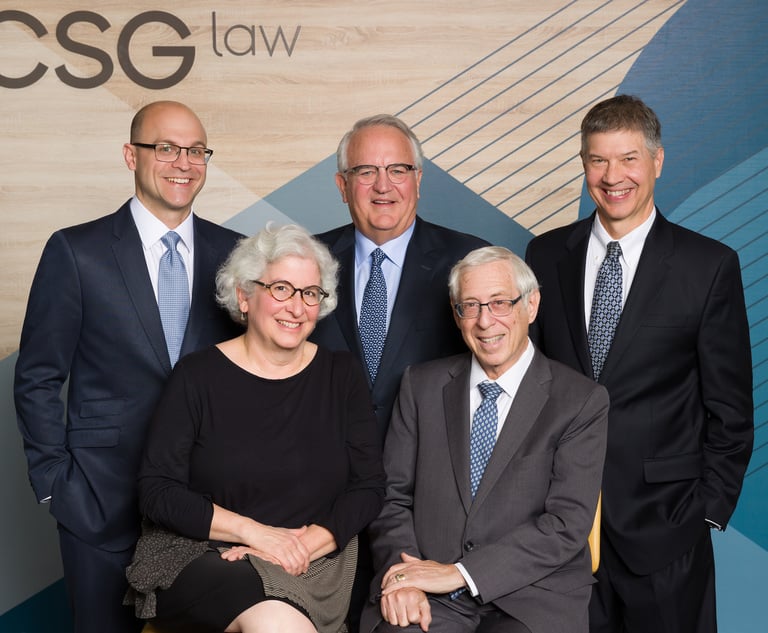Does the Changed Circumstance Standard Apply in Post-Judgment Cohabitation Cases?
The New Jersey Appellate Division recently grappled with this question in 'Landau v. Landau.'
October 25, 2019 at 10:00 AM
8 minute read

Ascertaining whether a supported spouse is cohabiting with a romantic partner in such a way that it constitutes a changed circumstance warranting a modification of alimony is often an issue that family courts have to address. In 2014, the New Jersey Legislature modified the alimony statute, N.J.S.A. 2A:34-23(n), to codify factors to determine whether a former spouse is cohabiting with a romantic partner such that an alimony award may be modified. Those factors are:
(1) Intertwined finances such as joint bank accounts and other joint holdings or liabilities;
(2) Sharing or joint responsibility for living expenses;
(3) Recognition of the relationship in the couple's social and family circle;
(4) Living together, the frequency of contact, the duration of the relationship, and other indicia of a mutually supportive intimate personal relationship;
(5) Sharing household chores;
(6) Whether the recipient of alimony has received an enforceable promise of support from another person; and
(7) All other relevant evidence.
The statute further provides that "in evaluating whether cohabitation is occurring and whether alimony should be suspended or terminated, the court shall also consider the length of the relationship. A court may not find an absence of cohabitation solely on grounds that the couple does not live together on a full-time basis."
In Landau v. Landau, A-1240-18, the Appellate Division recently grappled with the question of whether the changed circumstances standard of the seminal support modification case of Lepis v. Lepis, 83 N.J. 139, 157 (1980), continues to apply to motions to suspend or terminate alimony in cases where cohabitation is an issue given the 2014 amendments to the alimony statute.
The Appellate Division stated that the procedural requirements for proving cohabitation are the same post-2014 amendments as they were before the 2014 amendments to the statute. Moreover, the Appellate Division made clear that the "changed circumstances" standard created by Lepis v. Lepis, 83 N.J. 139, 157 (1980), continues to apply.
Therefore, the spouse paying alimony must make a prima facie showing that the dependent spouse is cohabiting. If the payor spouse meets his or her burden, then a rebuttable presumption is created that the dependent spouse is cohabiting, warranting a review of alimony. The parties then exchange discovery, and the spouse receiving alimony has the opportunity to overcome and rebut the presumption of changed circumstances by demonstrating that the need for continued alimony remains.
In late 2014, after the amendments to the alimony statute, the Landaus entered into a divorce agreement wherein Mr. Landau agreed to pay substantial alimony. Their agreement stated that "[n]otwithstanding anything contained herein to the contrary, the Wife's cohabitation as defined by then current statutory and case law shall be a basis for the Husband to file an application seeking a review and potential modification, suspension or termination of alimony pursuant to New Jersey law."
The facts of the case in Landau demonstrate the fact-sensitive nature of these cohabitation cases.
In December 2017, Mr. Landau filed an application to terminate, suspend or modify alimony based upon the his former wife's romantic relationship of more than a year. Mr. Landau alleged that his former wife and her paramour traveled together, attended social activities as a couple and posted photos and accounts of their activities on social media. He alleged that the paramour engaged in many activities with the parties' children and regularly slept over at Ms. Landau's home, as she also stayed overnight at her paramour's home. He claimed that the paramour attended events that he used to attend with Ms. Landau when they were married, such as family birthday dinners with her parents. Mr. Landau further claimed that the paramour attended the Bar Mitzvah of one of the parties' sons and was seated next to Ms. Landau in the position of honor for a parent of the child being Bar Mitzvahed. At the celebration afterwards, Mr. Landau claimed that Ms. Landau publicly acknowledged her paramour and their relationship in a speech. He also claimed that Ms. Landau informed him that she had moved her brokerage accounts to the investment firm where her paramour worked and received a "friends and family discount."
Ms. Landau asserted that she and her boyfriend were merely dating, had no obligations to one another, had never discussed their future or merging their lives together, and denied that they were in a relationship tantamount to marriage. They did not perform household chores for one another, had no intertwined finances, did not share living expenses and did not have authority over the other's children. She and her boyfriend took separate family vacations. She also attended various social events alone, noting that her boyfriend did not attend her law school graduation or swearing in ceremony. She stated that her boyfriend attended and sat next to her at her son's Bar Mitzvah only as her date. He did not participate in the ceremony nor was he included in family photos. She denied receiving any discount for moving her brokerage accounts, and denied that her boyfriend had anything to do with the accounts she had at the investment firm.
Mr. Landau also submitted a certification by a private investigator/former state trooper whom he employed to surveil Ms. Landau and her boyfriend. Although that individual certified that based on his "surveillances" and "other information" from Mr. Landau that indicated that Ms. Landau and her boyfriend were cohabiting in each other's residences for "75% of the time period examined," the investigator did not identify what that time period consisted of, and specified only two instances of either Ms. Landau or her boyfriend leaving the other's home in the morning.
Do the aforementioned facts establish a prima facie case of cohabitation and changed circumstance warranting Ms. Landau's providing discovery?
Following oral argument, the family court acknowledged that the "general task" of the judge is first to determine if the moving party had established a prima facie case of cohabitation, which would mean that Mr. Landau's "proffered evidence, if … unrebutted would … sustain a judgment" in his favor. The judge, however, decided that he was not going to decide whether Mr. Landau had established a prima facie case of cohabitation before ordering the exchange of discovery. Instead, the judge first directed Ms. Landau to provide extensive discovery in order to give Mr. Landau "the opportunity to make a showing of a prima facie case, or not, as the case may be."
The trial court established a two-year time period for which Ms. Landau had to provide the following detailed and extensive discovery, including:
- All bank account statements;
- All brokerage account statements;
- All IRA and retirement account statements;
- Documents reflecting all securities and investments;
- All records of transactions involving assets of any kind;
- Statements of all bank accounts not in defendant's or her boyfriend's names for which either was authorized to deposit or withdraw funds
- All records pertaining to real estate acquired;
- Copies of filed tax returns;
- Copies of all credit card and charge account records;
- Copies of all loan applications or financial statements;
- Copies of all travel receipts;
- Copies of all communications between defendant and any financial adviser;
- Copies of defendant's boyfriend's utility bills and all bank records and credit card statements for any account to which defendant has access; and
- Copies of all financial documentation relating to any items paid by Ms. Landau's boyfriend on her behalf.
Additionally, she was ordered to provide:
- All communications between between Ms. Landau and her boyfriend (including letters, cards, emails, texts and voicemails);
- Landau's personal and electronic calendar for all events attended in the past two years;
- Landau's and her boyfriend's EZ pass records;
- Copies of all of Ms. Landau's social media posts that named, identified, mentioned or tagged her boyfriend and any vacations taken with him;
- Depositions of Ms. Landau and her boyfriend.
The Appellate Division granted Ms. Landau's motion for leave to appeal and stayed the trial court's order for the exchange of discovery.
The Appellate Division ultimately determined that the party seeking the modification of alimony based on a claim of cohabitation still has the burden of showing that the changed circumstance of cohabitation warranted relief from the alimony obligation. The Appellate Division further held that the 2014 amendments to the alimony statute did not alter the requirement that a prima facie showing of changed circumstances must be made before a court will order discovery of a former spouse's financial status. The Appellate Division reversed the decision of the family court because the family court had directed the supported spouse to provide discovery without a finding by the court that the payor spouse had met his burden to demonstrate a prima facie case of changed circumstances.
This case demonstrates how fact-sensitive such cohabitation cases may be, and the usefulness of retaining counsel that not only understands this and can help you elicit and support the facts the establish or rebut allegations of cohabitation and change in circumstance, but the importance of having counsel that understands the proper legal standard and can convey the correct legal standard to the court.
Elsie Gonzalez is a family law attorney with The Law Office of James P. Yudes in Springfield.
|This content has been archived. It is available through our partners, LexisNexis® and Bloomberg Law.
To view this content, please continue to their sites.
Not a Lexis Subscriber?
Subscribe Now
Not a Bloomberg Law Subscriber?
Subscribe Now
NOT FOR REPRINT
© 2024 ALM Global, LLC, All Rights Reserved. Request academic re-use from www.copyright.com. All other uses, submit a request to [email protected]. For more information visit Asset & Logo Licensing.
You Might Like
View All
Appellate Div. Follows Fed Reasoning on Recusal for Legislator-Turned-Judge
4 minute read
Chiesa Shahinian Bolsters Corporate Practice With 5 From Newark Boutique
5 minute read
'A Mockery' of Deposition Rules: Walgreens Wins Sanctions Dispute Over Corporate Witness Allegedly Unfamiliar With Company
Trending Stories
Who Got The Work
Michael G. Bongiorno, Andrew Scott Dulberg and Elizabeth E. Driscoll from Wilmer Cutler Pickering Hale and Dorr have stepped in to represent Symbotic Inc., an A.I.-enabled technology platform that focuses on increasing supply chain efficiency, and other defendants in a pending shareholder derivative lawsuit. The case, filed Oct. 2 in Massachusetts District Court by the Brown Law Firm on behalf of Stephen Austen, accuses certain officers and directors of misleading investors in regard to Symbotic's potential for margin growth by failing to disclose that the company was not equipped to timely deploy its systems or manage expenses through project delays. The case, assigned to U.S. District Judge Nathaniel M. Gorton, is 1:24-cv-12522, Austen v. Cohen et al.
Who Got The Work
Edmund Polubinski and Marie Killmond of Davis Polk & Wardwell have entered appearances for data platform software development company MongoDB and other defendants in a pending shareholder derivative lawsuit. The action, filed Oct. 7 in New York Southern District Court by the Brown Law Firm, accuses the company's directors and/or officers of falsely expressing confidence in the company’s restructuring of its sales incentive plan and downplaying the severity of decreases in its upfront commitments. The case is 1:24-cv-07594, Roy v. Ittycheria et al.
Who Got The Work
Amy O. Bruchs and Kurt F. Ellison of Michael Best & Friedrich have entered appearances for Epic Systems Corp. in a pending employment discrimination lawsuit. The suit was filed Sept. 7 in Wisconsin Western District Court by Levine Eisberner LLC and Siri & Glimstad on behalf of a project manager who claims that he was wrongfully terminated after applying for a religious exemption to the defendant's COVID-19 vaccine mandate. The case, assigned to U.S. Magistrate Judge Anita Marie Boor, is 3:24-cv-00630, Secker, Nathan v. Epic Systems Corporation.
Who Got The Work
David X. Sullivan, Thomas J. Finn and Gregory A. Hall from McCarter & English have entered appearances for Sunrun Installation Services in a pending civil rights lawsuit. The complaint was filed Sept. 4 in Connecticut District Court by attorney Robert M. Berke on behalf of former employee George Edward Steins, who was arrested and charged with employing an unregistered home improvement salesperson. The complaint alleges that had Sunrun informed the Connecticut Department of Consumer Protection that the plaintiff's employment had ended in 2017 and that he no longer held Sunrun's home improvement contractor license, he would not have been hit with charges, which were dismissed in May 2024. The case, assigned to U.S. District Judge Jeffrey A. Meyer, is 3:24-cv-01423, Steins v. Sunrun, Inc. et al.
Who Got The Work
Greenberg Traurig shareholder Joshua L. Raskin has entered an appearance for boohoo.com UK Ltd. in a pending patent infringement lawsuit. The suit, filed Sept. 3 in Texas Eastern District Court by Rozier Hardt McDonough on behalf of Alto Dynamics, asserts five patents related to an online shopping platform. The case, assigned to U.S. District Judge Rodney Gilstrap, is 2:24-cv-00719, Alto Dynamics, LLC v. boohoo.com UK Limited.
Featured Firms
Law Offices of Gary Martin Hays & Associates, P.C.
(470) 294-1674
Law Offices of Mark E. Salomone
(857) 444-6468
Smith & Hassler
(713) 739-1250







